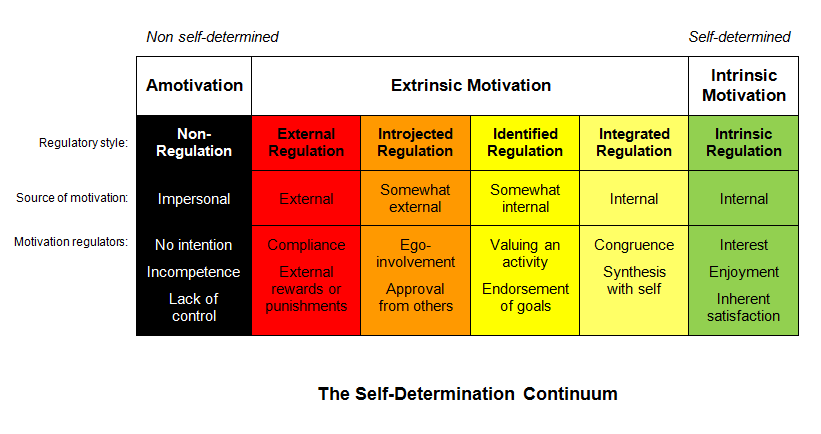"Self-determination theory is a key theory of motivation that has made a substantial contribution to predicting self-regulated behavior, including numerous health-related behaviors. This theory suggests that the quality of individuals' motivation affects the extent to which individuals will engage in, and persist with, behaviors" (Hagger, 2014)."Research suggests that the source of a goal will influence how goal pursuit is regulated and whether it will meet with success (Ryan, Sheldon, Kasser, & Deci, 1996). Goals that are not endorsed by the self are likely to generate intrapersonal conflict, whereas autonomous goals allow individuals to draw on volitional resources such as the capacity to exert
sustained effort" (Koestner et al, 2008).
"Autonomous motivation is defined as engaging in a behavior because it is perceived to be consistent with intrinsic goals or outcomes and emanates from the self. In other words, the behavior is self-determined. Individuals engaging in behaviors feel a sense of choice, personal endorsement, interest, and satisfaction and, as a consequence, are likely to persist with the behavior. The behavior is consistent with and supports the individuals' innate needs for autonomy, the need to feel like a personal agent in one's environment, competence, and the need to experience a sense of control and efficacy in one's actions. Individuals acting for autonomous reasons are more likely to initiate and persist with a behavior without any external reinforcement and contingency. Autonomously motivated individuals are, therefore, more likely to be effective in self-regulation of behavior. Controlled motivation, in contrast, reflects engaging in behaviors for externally referenced reasons such as to gain rewards or perceived approval from others or to avoid punishment or feelings of guilt. Individuals engaging in behavior for controlled reasons feel a sense of obligation and pressure when engaging in the behavior and are only likely to persist with the behavior as long as the external contingency is present. If the reinforcing agent is removed, action is likely to desist. Individuals who are control-motivated are therefore less likely to be self-regulated" (Koestner et al,2008).
There are two bases for autonomous regulation: intrinsic motivation and well-internalized extrinsic motivation. In contrast to autonomous regulation, controlled regulation pertains to feeling pressured to perform a behavior (Deci and Ryan 2000) or pursue a goal (Sheldon 2002). Autonomous regulation occurs by intrinsic (i.e., ‘‘because of the fun and enjoyment which the goal will provide’’) and identified reasons (i.e., ‘‘because you really believe that it is an important goal to have’’). On the other hand, controlling regulation occurs because of introjected (i.e., ‘‘because you would feel ashamed, guilty, or anxious if you didn’t’’) or external reasons (i.e., ‘‘because somebody else wants you to’’). These qualities are illustrated in the diagram below:

Through this distinction, we can essentially expand intrinsic and extrinsic causes of motivation to incorporate the new clarifications found through autonomous and controlling regulation.
All in all, autonomous and controlling goals are another facet of achievement goal theory used to understand the motives behind a goal or behavior. Its inclusion is a necessary component for self-determination theory which provides a broad framework to analyze behavior and inform behavior change in many contexts of social psychology such as education, health care, work organization, and parenting.


No comments:
Post a Comment